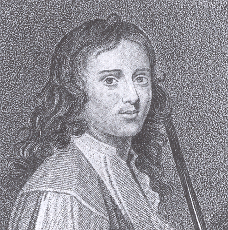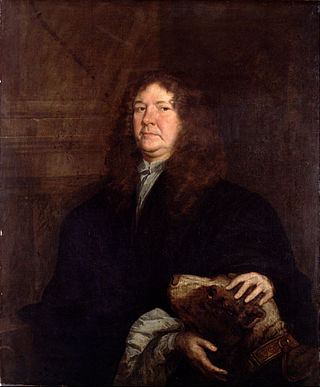Related Research Articles
The King's Men was the acting company to which William Shakespeare (1564–1616) belonged for most of his career. Formerly known as the Lord Chamberlain's Men during the reign of Queen Elizabeth I, they became the King's Men in 1603 when King James I ascended the throne and became the company's patron.

Michael Mohun was a leading English actor both before and after the 1642–60 closing of the theatres.
In Renaissance-era London, playing company was the usual term for a company of actors. These companies were organised around a group of ten or so shareholders, who performed in the plays but were also responsible for management. The sharers employed "hired men" – that is, the minor actors and the workers behind the scenes. The major companies were based at specific theatres in London; the most successful of them, William Shakespeare's company the King's Men, had the open-air Globe Theatre for summer seasons and the enclosed Blackfriars Theatre in the winters. The Admiral's Men occupied the Rose Theatre in the 1590s, and the Fortune Theatre in the early 17th century.
Queen Anne's Men was a playing company, or troupe of actors, in Jacobean-era London. In their own era they were known colloquially as the Queen's Men — as were Queen Elizabeth's Men and Queen Henrietta's Men, in theirs.
Beeston's Boys was the popular and colloquial name of The King and Queen's Young Company, a troupe of boy actors of the Caroline period, active mainly in the years 1637–1642.
Queen Henrietta's Men was an important playing company or troupe of actors of the Caroline era in London, England. At their peak of popularity, Queen Henrietta's Men were the second leading troupe of the day, after only the King's Men.
The King's Revels Men or King's Revels Company was a playing company or troupe of actors in seventeenth-century England. In the confusing theatre nomenclature of that era, it is sometimes called the second King's Revels Company, to distinguish it from an earlier troupe with the same title that was active in the 1607-9 period. Since the earlier group was a company of boy actors, they are alternatively referred to as the King's Revels Children, while the later troupe is termed the King's Revels Men.
Richard Perkins was a prominent early seventeenth-century actor, most famous for his performance in the role of Barabas in Christopher Marlowe's The Jew of Malta. At the peak of his career in the 1630s, many contemporaries judged Perkins to be the premier tragedian of his generation.
The Werburgh Street Theatre, also the Saint Werbrugh Street Theatre or the New Theatre, was a seventeenth-century theatre in Dublin, Ireland. Scholars and historians of the subject generally identify it as the "first custom-built theatre in the city," "the only pre-Restoration playhouse outside London," and the first Dublin theatre.
Theophilus Bird, or Bourne, was a seventeenth-century English actor. Bird began his stage career in the Stuart era of English Renaissance theatre, and ended it in the Restoration period; he was one of the relatively few actors who managed to resume their careers after the eighteen-year enforced hiatus (1642–60) when the theatres were closed during the English Civil War and the Interregnum.
King's Men personnel were the people who worked with and for the Lord Chamberlain's Men and the King's Men from 1594 to 1642. The company was the major theatrical enterprise of its era and featured some of the leading actors of their generation – Richard Burbage, John Lowin, and Joseph Taylor among other – and some leading clowns and comedians, like Will Kempe and Robert Armin. The company benefitted from the services of William Shakespeare, John Fletcher, and Philip Massinger as regular dramatists.
Michael Bowyer (1599–1645) was an actor in English Renaissance theatre in the Jacobean and Caroline eras. He spent most of his maturity with Queen Henrietta's Men, but finished his career with the King's Men. With the former company, he was one of "those of principal note," according to James Wright's Historia Histrionica (1699), one of the troupe's "eminent actors."
William Robbins, also Robins, Robinson, or Robson, was a prominent comic actor in the Jacobean and Caroline eras. During the English Civil War he was a captain in the Royalist army and was killed during the siege of Basing House.
William Allen was a prominent English actor in the Caroline era. He belonged to both of the most important theatre companies of his generation, Queen Henrietta's Men and the King's Men.
Nicholas Burt, or Birt or Burght among other variants, was a prominent English actor of the seventeenth century. In a long career, he was perhaps best known as the first actor to play the role of Othello in the Restoration era.
Anthony Turner was a noted English actor in the Caroline era. For most of his career he worked with Queen Henrietta's Men, one of the leading theatre companies of the time.
William Wintershall, also Wintersall or Wintersell, was a noted seventeenth-century English actor. His career spanned the difficult years of mid-century, when English theatres were closed from 1642 to 1660, during the English Civil War and the Interregnum.

William Cartwright was an English actor of the seventeenth century, whose career spanned the Caroline era to the Restoration. He is sometimes known as William Cartwright, Junior or William Cartwright the younger to distinguish him from his father, another William Cartwright, an actor of the previous generation.
Timothy Read was a comic actor of the Caroline era, and one of the most famous and popular performers of his generation.
John Sumner was an English theatre actor during the Caroline era (1625–1642).
References
- ↑ Edwin Nunzeger, A Dictionary of Actors and Other Persons Associated with the Public Representation of Plays in England Before 1642, New Haven, Yale University Press, 1929; pp. 90–1.
- ↑ Allan H. Stevenson, "James Shirley and the Actors of the First Irish Theatre," Modern Philology, Vol. 40 No. 2 (November 1942), pp. 147–60.
- ↑ Andrew Gurr, The Shakespeare Company 1594–1642, Cambridge, Cambridge University Press, 2004; p. 203.